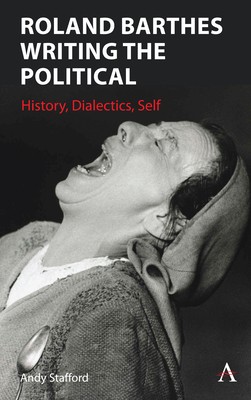
- We will send in 10–14 business days.
- Author: Andrew Stafford
- Publisher: Anthem Press
- Year: 2021
- Pages: 250
- ISBN-10: 1785278975
- ISBN-13: 9781785278976
- Format: 15.2 x 22.9 x 1.9 cm, hardcover
- Language: English
- SAVE -10% with code: EXTRA
Reviews
Description
Roland Barthes Writing the Political: History, Dialectics, Self is a re-reading and a re-purposing for the twenty-first century of the work and the critical theories of France's most important writer of the twentieth century. Drawing on articles and chapters published since 2007, and including new material written for the volume, it argues that Barthes's wide-ranging analyses and critical essays - from Voltaire to Nietzsche, Marx to myth, gay love to Japan - can be applied to debates and controversies in the contemporary world. By applying his 1958 essay on Voltaire to the aftermath in France of the 2015 terrorist attacks, by using Edouard Glissant's work as an unspoken dialogue to look at post-colonial writing strategies, the volume sets out what a dialectical critical practice might look like in our complex world of political, ethical and aesthetic choices.
In order to address the complexity of his critical practice, the study takes up a seldom-discussed notion which Barthes had originally developed in relation to the nineteenth-century historian Jules Michelet: that of the 'double grasp'. This 'double grasp' is used to think through photography and innovative forms of historiography (including a comparison with the work of Walter Benjamin), but also to account for the 'stereographic' approach with which Barthes read Balzac, visited Japan and then China, and even considered both the writing self and the imagined self. The book considers the persistence - and the functions - of myth in the era of image-saturated social media, using both early Marx and early Nietzsche, whilst relating Barthes's radical homosexuality and his questioning of binary structures to today's debates on post-gender. The volume ends with discussion of Barthes's essay-writing and its similarities with the theories on the essay of Hungarian Marxist George Lukacs in his 1910 'Letter to Leo Popper', and asks whether the essay, in its many Barthesian guises, is the future for radical forms of writing in the twenty-first century.EXTRA 10 % discount with code: EXTRA
The promotion ends in 17d.05:50:32
The discount code is valid when purchasing from 10 €. Discounts do not stack.
- Author: Andrew Stafford
- Publisher: Anthem Press
- Year: 2021
- Pages: 250
- ISBN-10: 1785278975
- ISBN-13: 9781785278976
- Format: 15.2 x 22.9 x 1.9 cm, hardcover
- Language: English English
Roland Barthes Writing the Political: History, Dialectics, Self is a re-reading and a re-purposing for the twenty-first century of the work and the critical theories of France's most important writer of the twentieth century. Drawing on articles and chapters published since 2007, and including new material written for the volume, it argues that Barthes's wide-ranging analyses and critical essays - from Voltaire to Nietzsche, Marx to myth, gay love to Japan - can be applied to debates and controversies in the contemporary world. By applying his 1958 essay on Voltaire to the aftermath in France of the 2015 terrorist attacks, by using Edouard Glissant's work as an unspoken dialogue to look at post-colonial writing strategies, the volume sets out what a dialectical critical practice might look like in our complex world of political, ethical and aesthetic choices.
In order to address the complexity of his critical practice, the study takes up a seldom-discussed notion which Barthes had originally developed in relation to the nineteenth-century historian Jules Michelet: that of the 'double grasp'. This 'double grasp' is used to think through photography and innovative forms of historiography (including a comparison with the work of Walter Benjamin), but also to account for the 'stereographic' approach with which Barthes read Balzac, visited Japan and then China, and even considered both the writing self and the imagined self. The book considers the persistence - and the functions - of myth in the era of image-saturated social media, using both early Marx and early Nietzsche, whilst relating Barthes's radical homosexuality and his questioning of binary structures to today's debates on post-gender. The volume ends with discussion of Barthes's essay-writing and its similarities with the theories on the essay of Hungarian Marxist George Lukacs in his 1910 'Letter to Leo Popper', and asks whether the essay, in its many Barthesian guises, is the future for radical forms of writing in the twenty-first century.

Reviews